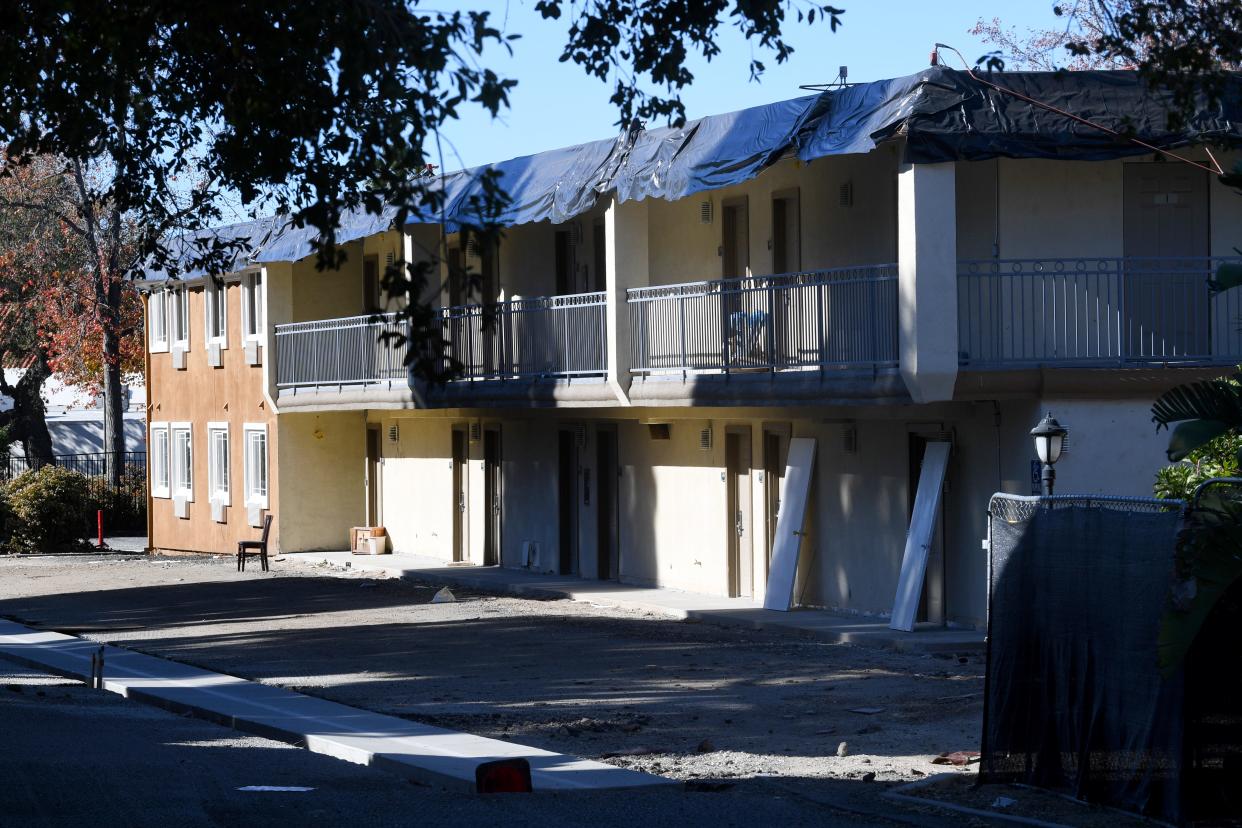California's attorney general sues developer of stalled Thousand Oaks homeless housing

Editor's note: This article was updated to reflect a change in the listed defendants in the final version of the state's legal complaint. The complaint names the cities of Thousand Oaks, Redlands, Salinas and King City, and the county of San Bernardino.
California's attorney general filed a lawsuit Monday against the owner and developer of several state-funded homeless housing projects, including the stalled conversion of the former Quality Inn & Suites in Thousand Oaks. The lawsuit also names the city of Thousand Oaks as a defendant.
Shangri-La Industries owns seven motels in California that are supposed to be converted to permanent supportive housing for homeless people. Under California’s Project Homekey, the state awarded Shangri-La $114 million to buy and renovate those properties.
Shangri-La's ability to complete those projects is in doubt; it hasn’t been paying many of its contractors and is in default on loans on all seven Homekey properties, with foreclosure looming in Thousand Oaks and other cities, The Star reported last month.
The state’s lawsuit, filed in Los Angeles County Superior Court by Attorney General Rob Bonta's office, accuses Shangri-La and its partners — including Thousand Oaks, four other cities and one county government — of violating the terms of their agreements with the California Department of Housing and Community Development. The suit also alleges violations of federal regulations, since much of the Project Homekey money came from the federal government’s pandemic relief programs.
The state is seeking the return of Shangri-La’s Homekey money as well as court orders that would stop foreclosure proceedings and guarantee that the properties be used for affordable housing. That guarantee would apply to future owners of the properties, should they be sold or foreclosed upon. The lawsuit also asks the court to appoint a receiver to oversee each Shangri-La property.
In a statement regarding the lawsuit, the California Department of Housing and Community Development said Shangri-La “has misrepresented multiple financial considerations and has yet to cure a number of breached contractual obligations to the state and the Homekey program. The difficulties they find themselves in are of their own making. … HCD will continue to make every effort to ensure Homekey dollars go toward housing individuals experiencing homelessness, and not enriching developers.”
Shangri-La executives did not return phone calls seeking their comment.
Though Thousand Oaks and other city governments are named as defendants in the state’s lawsuit, Thousand Oaks Assistant City Manager Ingrid Hardy said it is “quite clear that the responsibility of these breaches rests solely with Shangri-La Industries.”
“We are encouraging the state to focus on holding the responsible party to account,” she said.
One of the contract violations the state alleges is Shangri-La’s practice of taking out loans on properties in the Homekey program. For example, in Thousand Oaks, Shangri-La received $26.7 million in state funding to buy and renovate the Quality Inn & Suites property in 2022, and it spent $18.5 million on the purchase. Ventura County property records show that Shangri-La also took out two loans on the property, totaling about $12 million.
According to the state’s lawsuit, Shangri-La’s contracts with the state did not allow the company to borrow money against Homekey properties without prior written approval of the Department of Housing and Community Development. Shangri-La did not notify the department of the loans, and it also did not notify the state when it defaulted on the payments and the lenders filed notices of foreclosure, the lawsuit states.
Shangri-La stopped making payments on its loans for the Thousand Oaks property last year, and the primary lender has begun foreclosure proceedings to take the property. There is a foreclosure auction scheduled for Jan. 18.
Other contract violations alleged in the lawsuit include Shangri-La not paying the contractors who have worked on the motel renovation projects. Most of the Shangri-La projects, including the one in Thousand Oaks, are the subject of mechanic’s liens filed by roofers, plumbers and other subcontractors who say they haven’t been paid for their work.
A mechanic’s lien is a claim on the property by a subcontractor, putting the business in line for repayment if the property is sold or foreclosed upon.
On Dec. 22, the general contractor on the Quality Inn & Suites project sued Shangri-La, companies associated with it and the city of Thousand Oaks. F. Roberts Construction claims in the lawsuit that Shangri-La agreed to pay it $5.3 million for the motel renovation and owes $2.9 million for work that has been completed and was never paid for, plus interest, legal fees and other damages.
The state also alleges that Thousand Oaks and other cities with Shangri-La projects failed to put in place the proper restrictions that would guarantee the properties remain as low-cost housing for 55 years. If those covenants had been in place, they would likely have prevented Shangri-La from borrowing money against the Homekey properties.
Hardy said city officials continue to meet with Shangri-La’s representatives regarding the Quality Inn & Suites property. “They have indicated there is some work occurring on the site,” she said, but the city has not yet toured the property to see what’s been done lately.
Hardy said the city would love to see the state or a court step in to stop foreclosure or take other action to keep the project alive.
“From a city perspective, we definitely want to see this property built for its intended use,” she said. “We have a real need here to have this housing for people experiencing homelessness.”
Tony Biasotti is an investigative and watchdog reporter for the Ventura County Star. Reach him at tbiasotti@vcstar.com. This story was made possible by a grant from the Ventura County Community Foundation's Fund to Support Local Journalism.
This article originally appeared on Ventura County Star: California sues Shangri-La Industries over homeless housing

